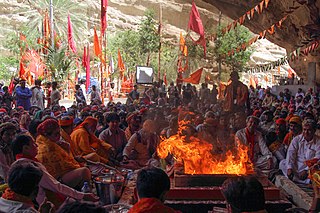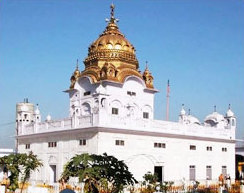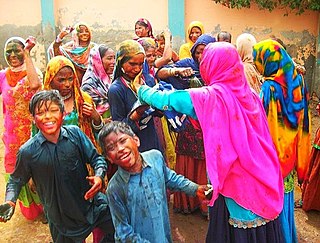
The administrative units of Pakistan comprise four provinces, one federal territory, and two disputed territories: the provinces of Punjab, Sindh, Khyber Pakhtunkhwa, and Balochistan; the Islamabad Capital Territory; and the administrative territories of Azad Jammu and Kashmir and Gilgit–Baltistan. As part of the Kashmir conflict with neighbouring India, Pakistan has also claimed sovereignty over the Indian-controlled territories of Jammu and Kashmir and Ladakh since the First Kashmir War of 1947–1948. It also has a territorial dispute with India over Junagadh, but has never exercised administrative authority over either regions. All of Pakistan's provinces and territories are subdivided into divisions, which are further subdivided into districts, and then tehsils, which are again further subdivided into union councils.

Hinduism is the second largest religious affiliation in Pakistan after Islam. Though Hinduism was one of the dominant faiths in the region a few centuries ago, its adherents accounted for just 2.17% of Pakistan's population according to the 2023 Pakistani census. With the largest population concentration in eastern Sindh province, Umerkot district has the highest percentage of Hindu residents in the country at 54.6%, while Tharparkar district has the most Hindus in absolute numbers at 811,507. Hindus are also found in southern Punjab and in areas of Balochistan and Khyber Pakhtunkhwa.

Dera Ghazi Khan, abbreviated as D.G. Khan, is a city in the southwestern part of Punjab, Pakistan. It is the 23th most populous city of Pakistan as of 2023. Lying west of the Indus River, it is the headquarters of Dera Ghazi Khan District and Dera Ghazi Khan Division. Punjab Pakistan

Hazara, historically known as Pakhli, is a region in northern Pakistan, falling administratively within the Hazara Division of the Khyber Pakhtunkhwa province. It forms the northernmost portion of Sindh Sagar Doab, and is mainly populated by the indigenous Hindko-speaking Hindkowans and Kohistani people, with a significant Pashto-speaking population. The inhabitants of Hazara are collectively called the Hazarewal.

Sikhism is the fourth largest religion in Pakistan with a population of more than 15,000 Sikhs, mostly residing in Punjab and Khyber Pakhtunkhwa, accounting for 0.01% of the country's population. Nankana Sahib, the birthplace of Guru Nanak, is located in Pakistan's Punjab province. Moreover, the place where Guru Nanak died, the Gurudwara Kartarpur Sahib is also located in the same province.

Anand Karaj is the Sikh wedding ceremony, meaning "Act towards happiness" or "Act towards happy life", that was introduced by Guru Amar Das. The four laavaan were composed by his successor, Guru Ram Das. Although the recitation of Guru Amar Das' stanzas in Sikh ceremonies is a historical and enduring tradition, the practice of circumambulating around the Guru Granth Sahib to conduct a marriage ceremony is a relatively recent innovation that supplanted the tradition of circumambulating around the sacred fire (havan) in the early twentieth century.

Mian Muhammad Shehbaz Sharif is a Pakistani politician and businessman who has served as Prime Minister of Pakistan since March 2024, having previously served as the prime minister from April 2022 to August 2023. He has also served as the president of the Pakistan Muslim League (N) (PML-N). Previously, he served as the chief minister of Punjab three times, making him the longest-serving chief minister of Punjab.
S. Tarlochan Singh is an Indian politician. He is a Member of the Parliament of India, representing Haryana. He served as Chairman National Commission for Minorities from 2003 to 2006, was member, National Human Rights Commission of India, Govt. of India, 2003 to 2006. He served as Vice Chairman, National Commission for Minorities from 2000 to 2003.

Syed Afzal Haider was a Pakistani legal figure who was the caretaker Law, Justice, and Parliamentary Affairs minister. He was also an author of several books.

Rana Sanaullah Khan is a Pakistani lawyer and politician who is currently serving as Special Assistant to the Prime Minister on Political Affairs since April 2024. Previously, he served as the 39th Interior Minister of Pakistan in first Shehbaz Sharif's Government. He is second most popular official in Shehbaz Sharif Government. He's been a member of the National Assembly of Pakistan from August 2018 till August 2023. He is a senior member of PML-N and the President of PML-N in Punjab province since 4 May 2019. Before getting elected to the National Assembly of Pakistan, Sanaullah had been elected to the Provincial Assembly of Punjab five times and had served in high-ranking ministries of the province.
Religious discrimination in Pakistan is a serious issue for the human rights situation in modern-day Pakistan. Christians, Hindus, Sikhs, Shias, and Qadiyanis among other religious minorities often face discrimination and at times are even subjected to violence. In some cases Christian churches and the worshippers themselves have been attacked. Although, there is very little record of this. Khawaja Nazimuddin, the 2nd Prime Minister of Pakistan, stated: "I do not agree that religion is a private affair of the individual nor do I agree that in an Islamic state every citizen has identical rights, no matter what his caste, creed or faith be".

Muhammad Baligh Ur Rehman is a Pakistani politician who is the former Governor of Punjab, he served in office from 30 May 2022 till 10 May 2024.

The Shiromani Akali Dal (SAD) is a centre-right Sikh-centric state political party in Punjab, India. The party is the second-oldest in India, after Congress, being founded in 1920. Although there are many parties with the description Akali Dal, the party that is recognized as "Shiromani Akali Dal" by the Election Commission of India is the one led by Sukhbir Singh Badal. The party has a moderate Punjabi agenda. On 26 September 2020, it left the National Democratic Alliance over the farm bills.
Protection of Women Against Violence Bill 2015 is a bill drafted by CM's Special Monitoring Unit and passed by the Provincial Assembly of the Punjab which was signed into a law on 1 March 2016 by Malik Muhammad Rafique Rajwana. The law declares physical violence, abusive language, stalking, cyber crimes, sexual violence, psychological and emotional abuse against women a crime in Punjab, home to 60% of Pakistan's population. Additionally, it creates a toll-free universal access number (UAN) to receive complaints while district protection committees will be established to investigate complaints filed by women. Centres will also be set up for reconciliation and resolution of disputes. Every district would have women's shelters and district-level panels to investigate reports of abuse and mandates the use of GPS bracelets to keep track of offenders
Yasmeen Rehman is a Pakistani politician who served as member of the National Assembly of Pakistan.

The Twenty-fifth Amendment to the Constitution of Pakistan was passed by the Parliament of Pakistan and the Khyber Pakhtunkhwa Assembly in May 2018. Under the amendment, the Federally Administered Tribal Areas (FATA) and Provincially Administered Tribal Areas (PATA) are to be merged with the province of Khyber Pakhtunkhwa (KP).

The Kartarpur Corridor is a visa-free border crossing and religious corridor, connecting the Gurdwara Darbar Sahib, near Narowal in Pakistan to Gurudwara Dera Baba Nanak, Gurdaspur district, Punjab, India. The crossing allows devotees from India to visit the gurdwara in Kartarpur, Pakistan, 4.7 kilometres from the India–Pakistan border on the Pakistani side without a visa. However, Pakistani Sikhs are unable to use the border crossing, and cannot access Dera Baba Nanak on the Indian side without first obtaining an Indian visa or unless they work there.

Hazara Province Movement is a movement aimed at gaining a separate provincial status for the Hazara Division of Khyber Pakhtunkhwa.

In Pakistan, there are two laws governing Hindu marriages. One is the Sindh Hindu Marriage Act of 2016 which is applicable in the Sindh province of Pakistan and another is the Hindu Marriage Act of 2017 which is applicable in Islamabad Capital Territory, Balochistan, Khyber-Pakhtunkhwa and Punjab provinces. However, there are no laws and amendments made to register a marriage between two Hindus- one from Sindh and another from a different Province. Most of its articles are borrowed from Hindu Marriage Act, 1955 of British India, which was passed by British Raj.

Hinduism is a minority religion in Punjab province of Pakistan followed by about 0.19% of its population. Punjab has the second largest number of Hindus in Pakistan after Sindh. Hinduism is followed mainly in the Southern Punjab districts of Rahim Yar Khan and Bahawalpur.















